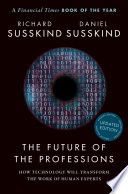

The book discusses how automation and artificial intelligence are transforming traditional professions. These technologies are not just tools but are becoming integral to the way work is done. Professions that rely on repetitive tasks, data analysis, and even some creative processes are increasingly being handled by machines. This shift raises questions about the future roles of professionals, as AI can outperform human capabilities in various areas. The authors argue that while some jobs may disappear, new roles will emerge that require human oversight, creativity, and emotional intelligence. This transformation demands a shift in education and training to prepare the workforce for a future where collaboration with AI is essential.
Continue readingThe book highlights how traditional professional models are being disrupted by new business models and technologies. Professions like law, medicine, and accounting have historically been structured around a set of established practices and hierarchies. However, the emergence of online platforms, freelance work, and gig economies is challenging these norms. Professionals are now competing with non-traditional service providers who can offer similar services at lower costs. The authors emphasize the need for established professionals to adapt to these changes by innovating their service delivery and embracing new technologies to remain relevant.
Continue readingThe book argues for the necessity of interdisciplinary collaboration in the future of work. As problems become more complex, solutions often require input from various fields. The authors suggest that professionals must learn to work across disciplines to leverage diverse perspectives and expertise. This collaboration can lead to more innovative and effective solutions, especially in fields like healthcare, education, and technology. The book encourages educational institutions to foster interdisciplinary approaches to learning, preparing students for a future where collaboration is key to success.
Continue readingAnother core idea is the changing nature of expertise and how it is defined in the modern context. With access to vast amounts of information through the internet, the traditional gatekeeping role of professionals is being challenged. The authors discuss the democratization of knowledge and how this impacts the perception of expertise. Professionals must now demonstrate their value not just through credentials but by their ability to apply knowledge effectively and adapt to new information. This shift necessitates a reevaluation of how professionals are trained and how they communicate their expertise to clients and the public.
Continue readingThe book emphasizes that technology should be viewed as an enabler rather than a threat to professional services. The authors argue that technology can enhance the quality of services provided by professionals, allowing them to focus on higher-value tasks. For instance, in healthcare, technology can assist with diagnostics, freeing up doctors to spend more time on patient care. The authors advocate for a mindset shift where professionals embrace technology as a partner in their work, leading to improved outcomes for both service providers and clients.
Continue readingAs professions evolve, ethical considerations become increasingly important. The book discusses how the integration of AI and automation raises ethical questions about accountability, bias, and the nature of professional responsibility. The authors stress the need for professionals to engage in ethical discussions about their work and the implications of technology on society. This includes considering the impact of automation on employment, privacy concerns with data usage, and ensuring that technological advancements serve the public good.
Continue readingFinally, the book addresses the future of education and training in light of these changes. Traditional educational models may not adequately prepare students for the realities of the modern workforce. The authors advocate for more flexible, adaptive learning environments that emphasize critical thinking, problem-solving, and collaboration. They suggest that lifelong learning will become essential as professionals need to continuously update their skills to keep pace with technological advancements. The future of education should focus on fostering a mindset of adaptability and resilience among learners.
Continue readingThe reading time for The Future of the Professions depends on the reader's pace. However, this concise book summary covers the 7 key ideas from The Future of the Professions, allowing you to quickly understand the main concepts, insights, and practical applications in around 23 min.
The Future of the Professions is definitely worth reading. The book covers essential topics including The Rise of Automation and AI, Disruption of Traditional Professional Models, The Importance of Interdisciplinary Collaboration, providing practical insights and actionable advice. Whether you read the full book or our concise summary, The Future of the Professions delivers valuable knowledge that can help you improve your understanding and apply these concepts in your personal or professional life.
The Future of the Professions was written by Daniel Susskind, Richard Susskind.
If you enjoyed The Future of the Professions by Daniel Susskind, Richard Susskind and want to explore similar topics or deepen your understanding, we highly recommend these related book summaries:
These books cover related themes, complementary concepts, and will help you build upon the knowledge gained from The Future of the Professions. Each of these summaries provides concise insights that can further enhance your understanding and practical application of the ideas presented in The Future of the Professions.